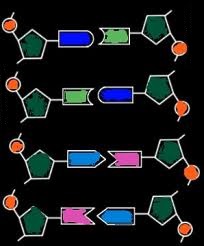Nature and Nurture
By Anthony Casperson
1-18-20
Earlier this week, I was listening to a sermon where the preacher made a passing reference to the first half of Psalm 139:14. He spoke about how we humans are designed specifically by the hand of God, “fearfully and wonderfully made.” The preacher even went so far as to speak about God causing the specific sperm to fertilize the egg that would come together to make us.
Often, when I hear from this verse, I think about God purposefully crafting each individual in the smallest details, down to the very genetic composition of our bodies. He decides which of the four main bases of DNA (abbreviated as G, C, A, or T) goes where in the sequence of each strand. Incredible detail undertaken in order for him to create a single life.
This invention of our physical bodies is usually as far as we go when looking at Psalm 139:14 as well as the preceding verse, where God is said to have knitted together we humans in the womb. God gave us the physical aspect of our being, created at the moment of conception.
But what I think is often missed (and I’m guilty of this as well) is that the psalm extends God’s role in our stories beyond just genetic manipulator. It’s not just our physical beings that he gives to us when he creates us, but also the journey that our lives take.
Verse 16 records these words, “Your eyes saw my unformed substance; in your book were written, every one of them, the days that were formed for me, when as yet there were none of them” (ESV).
The psalmist, David, writes that even before the time our cluster of cells has taken human shape, God held a record of our existence. The choices we’d make, the path we’d walk, the person we’ll become, all known by God and set as history.
Those little nudges that caused us to make a certain decision were crafted by God at the same time that he set our eye color. There is no part of who we are, both nature and nurture, that doesn’t contain the fingerprints of God.
Earlier verses in the psalm even go so far as to say that there’s nowhere we can go where God isn’t. Usually, we think of this as God’s ability to be all places at all times (omnipresence). But in the context of the psalm, I wonder if it should be thought of as God being there already because he knew that we’d go to that place before we even thought to go there. I mean, in verse 4, it says that God knows the words that we’ll speak before we even start speaking them.
For some, this thought of God not just designing our bodies, but also our journey is an amazing thought. God is so intricately involved in our human existence that he not only knows our favorite food, but also the experiences that have caused it to be our favorite. (And formed our taste buds to compliment it before we’d ever had a single bite.)
But for others, this idea might seem unfair. “You mean it’s God’s fault that I have to suffer?” “God caused the chemicals in my brain to imbalance?” “It was God that sent my path down to a place of abuse?” “My parent/sibling/child/other person I love never came to a relationship with Jesus, and it was God that sent their path down that line?”
While this blog post isn’t the place to fully tackle “the problem of evil,” I feel it is important to point out that this is where sin and human freewill each have a place. It was humanity’s freewill that caused sin to enter the world to begin with. And continuing choices of sinful people (going against the preferences of God for every bearer of his image) often lead to problems and complications in the lives of others.
This world, sovereignly created by God (including our free choices), is the universe that God made for reasons that are far beyond any human’s capability to understand. But there is one thing that God’s word speaks to in this. God has a purpose in it.
Whether our stories are filled with great highs or incredible lows, we can praise God for the crafted purpose he has. Even our doubts and questions are known by him…and they can never remove his love. The love that caused him to enflesh himself in humanity so that he could die for us.




